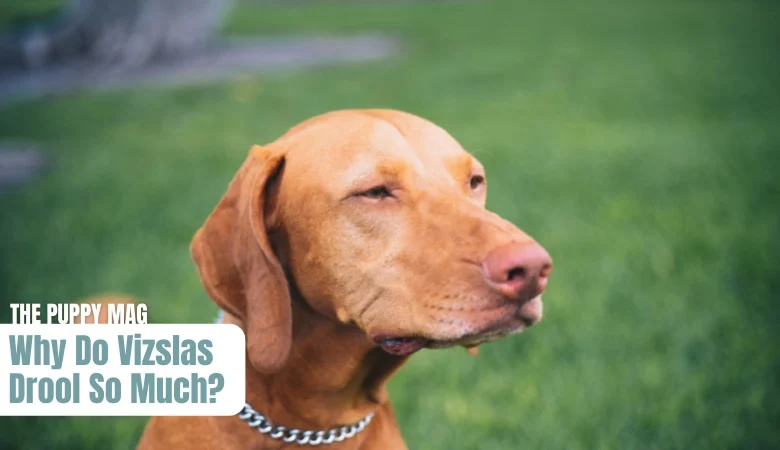If your vizsla has started drooling excessively then you aren’t alone! This is fairly common among vizslas, and there are many explanations. This article will explain when drooling is normal, abnormal, and what you can do about it.

Table of Contents
5 Reasons Why Your Vizsla Drools So Much
Let’s run through the range of NORMAL reasons why your Vizsla is drooling.
1. Drooling On Walks (Field Drooling)
Some refer to this as field drooling or even “hunters drool”. This happens to many vizsla’s when outside and in the presence of other animals like birds, squirrels, and rabbits.
Vizslas were bred to work as pointers, and have strong prey drive instincts to find, hunt and retrieve wild game.
As It happens, drooling and producing excess saliva actually enhances their ability to smell which is their primary sense used to point wild animals.
If you notice your vizsla to start drooling on walks, especially if you’re in a location where other wild animals could be, this is considered a normal reason to drool.
2. Anticipating Food
Most vizslas have a keen appetite, especially if they receive as much exercise as they should be.
Anticipating food, smelling food, waiting for a treat, or even as dinner time approaches, drooling is a normal reaction.
The production of saliva happens to prepare the body for the ingestion of food.
Not only does it make swallowing easier, but it lets the stomach know that food will soon be entering the system. Saliva also contains enzymes that are used to help break down the food.
Even if your vizsla thinks he’s receiving food (when actually he isn’t) it’s still enough to kickstart the production of saliva.
3. In a Stressful Situation
If your vizsla suddenly and unexpectedly finds himself in a stressful situation, like an unforeseen fight or argument with another dog while out on a walk, drooling can be a natural response.
Other situations like loud noises, fireworks, being startled, or anything unusual that causes immediate stress could result in quick saliva production.
4. When Females Enter Into Heat
Whether it’s her first heat or not, drooling can sometimes happen as a result of the many physiological changes in her body.
This can also happen to males when close to a female that’s in heat or entering into heat.
5. When Excited or Playing
Lastly, drooling can happen randomly when getting excited, aroused or just playing in general.
Sometimes all it takes is a new toy or playmate and the drooling commences.
As you can see, the reasons outline above count for a lot of different situations.
Most of the time, your Vizsla’s excessive drooling can likely be explained by at least one of them.
Popular Vizsla Articles:
● Can Vizslas Live & Sleep Outside?
● Why Your Vizsla May Be Skinnier Than Normal
● When Do Vizslas Stop Growing?
Can Excessive Drooling Be Bad For Vizslas?
Unfortunately, excessive saliva can start causing issues for some vizslas. When the salivary glands produce too much saliva, it can become hard for your vizsla to swallow it.
This creates too much moisture which can then lead to irritation and inflammation.
The official term that veterinarians use for excessive salivation is Ptyalism.
Signs to watch out for:
- Drooling for no apparent reason, consistently all the time
- Drooling increases in both frequency and amount
- Your vizsla start showing signs of irritation around the mouth (pawing at the mouth)
- You can see redness around the mouth or inflammation
- Your vizsla starts refusing to eat (to avoid further irritation)
- Saliva starts appearing foamy and white
- Drooling is accompanied by vomiting, diarrhea, or behavioral changes
If you notice any of the signs above then it’s best to contact your veterinarian for further advice and assistance.
Negative Causes Of Excessive Drooling In Vizslas
Although drooling can be caused by many situations considered normal, it can also happen for some negative reasons too. Let’s run through them.
Causes of excessive drooling in vizslas:
- Dental issues (inflamed tonsils, infections, irritation, gingivitis & more)
- Stomach issues (consumption of rotten foods or toxic ingredients)
- Difficulty in swallowing (something may be stuck on the roof of the mouth, or obstructing airways)
- Reacting to allergies
- Reacting to medication
- Canine-tumors
- Illness, disease, or general sickness
When To See a Veterinarian
Due to there being a range of serious causes for excessive salivation, it’s always best to have health issues ruled out by a veterinarian.
Unless your Vizsla only drools for obvious reasons like when he receives food, or when out for walks in areas where other wildlife are present it’s best to give your veterinarian a call.
It’s very hard for us to diagnose issues over the internet and I myself have to admit to googling a few too many things that I should have just let the veterinarian deal with first hand.
Last Thoughts
Drooling, for the most part, is very normal and can be explained easily depending on when and how often your vizsla drools. Remember that some breeds tend to drool more than others, and vizslas happen to be one of them.
However, despite drooling being mostly normal, it’s also a known symptom for a range of potential health issues, some of which can be serious.
Due to this, it’s always best to seek professional advice from your local veterinarian if your vizsla starts drooling without a very obvious explanation.
● Thank you for reading! I hope this has cleared up your questions about your vizsla’s excessive drooling habits. All the best, Harry.
